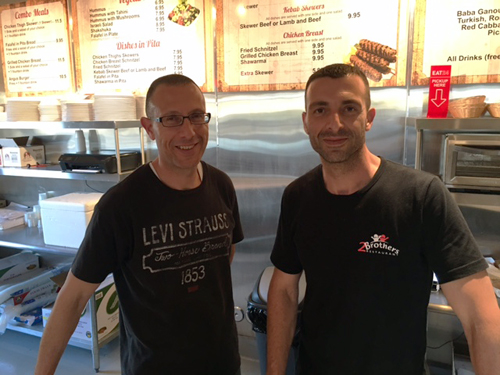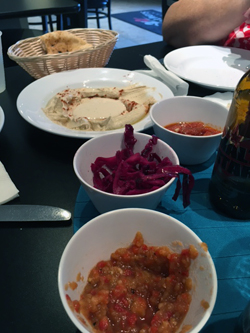
Hiney ma tov u’ma-nayim shevet achim gam yachad –Here is something good and nice, two brothers together in unity – Psalm 133
By Donald H. Harrison


SAN DIEGO –2Brothers Restaurant in San Diego is unabashedly Israeli – a sign above the door proclaims it – and brothers Ofer and Amir Grissaro proudly tell visitors that Arab-Americans have become some of their best customers.
There are plenty of Arab restaurants in San Diego, to be sure, especially Lebanese and Iraqi, while the foods of the Mediterranean and the Middle East also are represented by various Persian and Greek cafes. But while you will see at 2Brothers similar menu items as at those restaurants, says Ofer, “it’s not the same – the spices are different.”
While some Arabs have welcomed the Israeli restaurant at the northwest corner of El Cajon and Rolando Boulevards, he said, others have not. When 2Brothers first opened earlier this year, a number of hostile, uncomplimentary reviews were posted on Yelp by people whom Ofer complained to the Internet rating service had never stepped foot in the restaurant. Yelp took those reviews down. And, he said, a few Arabs came in the El Cajon Boulevard entrance of the restaurant and upon seeing the “Israeli Restaurant” sign on the Rolando Boulevard side, walked out.
Arab customers are an unanticipated benefit for the restaurant, which sees a wide diversity of customers, said Ofer. When he and Amir initially studied the local market, they based their decision to locate here on the fact that there are approximately 100,000 Jews living in San Diego County. They hope that those with a fondness for Israel and its cuisine will become regular customers.
2Brothers is a case study in cross-cultural adjustment. Ofer said he and his brother, as well as their Polish-born mother Hella, are astounded by the differences between Israeli and American dining habits.
“Americans want coupons! It is amazing,” said Ofer, who minds the front of the restaurant while his brother Amir and Hella do the cooking. “In Israel, we have coupons, but nobody uses them. They’re only for the poor, so you would be embarrassed to use them. Here I see people who clearly have money, smiling and happy, and waving their coupons! Come on! It’s a big shock for us to see this mentality. And even the Israelis here, after a while they become like the Americans.”
On a recent occasion, he said, a family of nine came into the restaurant. A group that size normally will order at least $100 worth of food. But the people in this family shared their plates, and spent only $50. “In Israel,” he sighed, “if you don’t have money, you don’t go to a restaurant!”
Not that 2Brothers is expensive, just the reverse. Initially it offered an entrée with two hot sides and two cold salads, and pita, for $10.50. “Everybody told us that is too much food, so we decided to change the price to $8.95 with one hot side and one cold side. Then people said, you’re not charging enough money, you are going to lose – so we made a little change.” The meals now list at $9.95.
Clearly, 2Brothers is adjusting to the American market. But how are Americans adjusting to Israeli food?
Ofer said that the falafel pita, which is the most inexpensive item on the menu, is perhaps the most popular, although the combination plates offer the best deals. Shakshuka, eggs poached in a tomato-based sauce, is popular among those in the know.
Eating there just recently, members of my party tried the combination lamb and beef kabob, a chicken skewer, and the schnitzel. Another in our party contented herself with the pita and Israeli hummus – which is thick and delicious! We all got to share such side dishes as Romanian eggplant and garlic (the Grissaro Brothers’ father is Romanian); purple cabbage, green cabbage, and a combination made from red and green peppers, tomato, garlic and onions. One thing Ofer wanted us all to know, “Our food is fresh every day!”
Among available beverages was one which Nancy nor I had never tried – a non alcoholic Malt Star – which my dinner companions, Israel and Frieda Barken, told me was popular in Israel. Personally, I didn’t take to it; Israel Barken on the other hand had two. Clearly it’s an acquired taste. However, the rest of the meal I very much enjoyed.
What will take some getting used to for American diners is the relaxed, some would say slow, process by which one goes to the counter and orders the food. The hot sides are in covered warming dishes, and Ofer or one of the waitresses, standing behind a glass partition, whips each cover off in turn to describe the sides of the day. I had a browned and spiced potato; another choice I remember was cooked mushrooms. There also were peas and carrots; two kinds of rice, and cooked red cabbage. Then one continues toward the cash register to pick the cold sides. The entrees are listed on a sign board, and the beverages are displayed in a case. Although you pass the register, you don’t pay there; you pay as you would at any sit-down restaurant, after your dinner.
One can sit inside the restaurant, where one can see and hear a television which on our visit was tuned to the Olympics; or in a covered wrap-around patio.
The Grissaro brothers have taken a five-year lease on the property. They hope to see many San Diegans again and again long before that lease expires.
*
Harrison is editor of San Diego Jewish World. He may be contacted via donald.harrison@sdjewishworld.com